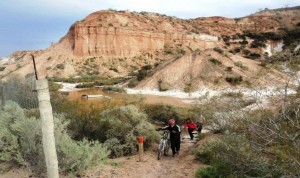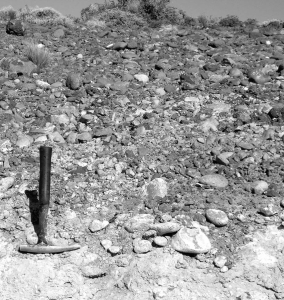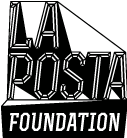Taking advantage of a trip from Argentina, María Eugenia Cordero and Andrea Beltramo, director and curator of the Museo del Bardo del Desierto (Rio Negro, Argentina), come to Fundación la Posta to present this unique initiative that combines the possibility of a visit to an open-air art space that stores his works on the web (which is accessed with the corresponding georeferencing), with an artistic experience in itself: wandering through this unique landscape of the Alto Valle del Río Negro, unique not only from a plastic point of view but also from a conceptual one, due to what is entropic or dialectical about it. Located between the banks of the Neuquén River and Pellegrini Lake, it is in an area of very high aridity (almost desert), characterized by the presence of “bardas” (hillside cliffs), which bears important concomitances with some Spanish landscapes, such as those of the badlands, territories of which there are in abundance, in particular, in the province of Alicante, repositories of a beauty to be discovered, for which we think that it can be of great interest to bring his memory to the public of Valencia.
The Barda del Desierto Museum is a research platform and eco-museum that has been in North Patagonia for ten years. First as an artistic residence, today as a space where curatorial programs, educational art, library and residence come together. The Museum is proposed as a space sensitive to the 2030 Sustainable Development Goals. With a territorial extension of almost seventy hectares, it is located in the province of Río Negro, Argentina. It is a place to be visited as a game, as a search, an opportunity to meet with the works and get into the geography of the “bardas”. Its tour invites an interpretative position on the landscape, the diversity of its flora and fauna and proposes a dialogue between the work of art and a territory.
The Museum has the support of the following institutions: Secretary of Culture of Río Negro, National Endowment for the Arts (Creation Scholarship, Training Scholarship and Subsidy Line for Improvement of Cultural Spaces), Nation Culture Points, Williams Foundation and the Cultural Center of Spain in Buenos Aires (CCEBA). Opened in April 2022.

The “bardas” are typical of the Alto Valle del Rio Negro region, where the Barda del Desierto Museum is located.

In the same region we find the «Rodados Patagónicos». “The «Rodados Patagónicos» (Patagonian Boulders) are some of the most striking lithostratigraphic units of the late Cenozoic of Patagonia. Charles Darwin gave these gravels the name of the Patagonian Shingle Formation, when he discovered them during his voyage to Patagonia on the HMS Beagle in 1832. In accordance with the prevailing paradigms of the time, he assigned these deposits to a gigantic transgression during the «Great Universal Flood», considering that its formation was related to wave action along the beach in ancient times. The name Rodados Patagonicos, as they are generally known in Argentine geological literature, is confusing, since it has been applied to a large number of geological units of multiple origins and ages. Many authors have discussed the nature and genesis of these gravels, considering them as formed by various processes, whether piedmont, alluvial, colluvial, glaciofluvial, and/or marine. Currently, it is accepted that the term Rodados Patagonicos includes gravel deposits of very varied nature and age, perhaps with a predominance of those of piedmont genesis in northern Patagonia and due to glaciofluvial dynamics in southern Patagonia and Tierra del Fuego” [Oscar A. MARTÍNEZ, Jorge RABASSA, Andrea CORONATO: “Charles Darwin and the first scientific observations on the Patagonian shingle formation (Rodados Patagonicos)”, Journal of the Argentine Geological Association 64 (1): 90 – 100 (2009)]
____________________________
María Eugenia Cordero
Formed at the National University of the Arts, Argentina. She lives and works in Norpatagonia, Argentina, and São Paulo, Brazil. She reconciles teaching with directing the Museo del Bardo del Desierto (Río Negro) in which she develops four work programs in artistic practices: curatorship, research, art-educational and residency, with a territorial scope of application in Argentine Patagonia. She is currently studying for a Diploma in Bioarchitecture [UTN -FADAE- FPPA]. During 2021 she attends the seminar at Clacso: Educating through museums. Teaching of the past, formation of citizenship and didactic curatorship.
She is a member of the Nucleus of Postcolonial Studies, Performances, Afrodiasporic Identities and Feminisms (NUSUR), of the Institute of Higher Social Studies (IDAES), of the National University of San Martín. Since 2019, she has been a member of the “Poscoloniality Program, border and cross-border thought in feminist studies” (IDAES / UNSAM). Together with Andrea Beltramo, she coordinates and curates the table Des / hacer archivo, decolonial artistic and aesthetic practices, the Congress of Postcolonial Studies and Conferences on Postcolonial Feminism. She, as well as the curator of the panel Situated artistic practices, territories of memory and choreographies of denunciation, of the same congress (2018). As well as other projects in Guadalajara Mexico (Proyecta Award – 2019); co-founder and coordinator of the curatorial project Interjections SUR, geographies of violence, with which they held exhibitions and academic activities in Argentina, Brazil, Spain, Chile and Colombia [Winner of the PROAC award – 2017]; she made, together with Juliana Curi, the textile installation “A batalha do corpo”, SP, Brazil-CCSP-2016.
Andrea Beltramo
She is a curator, manager and cultural producer. She specialized in poetics and archival intervention. She is currently a coordinator at the Barda del Desierto Museum (Río Negro). She was coordinator of the project “Territories of memory, choreographies of the complaint” (2018-2020). He coordinated the curatorial project Interjections SUR, which won the Stimulus Prize of the Culture Incentive Program of the government of the state of Sao Paulo, Brazil (ProacSP/2014) and had the support of the Office of Cooperation for Development and Solidarity of the University of the Balearic Islands (OCDS/UIB/2016-2017), with which he held exhibitions and academic activities in Argentina, Brazil and Spain (2015-2019). She is a member of the Nucleus of Postcolonial Studies, Performances, Afrodiasporic Identities and Feminisms (NUSUR), (IDAES / UNSAM). Between 2014 and 2020 she was part of the “Poscoloniality Program, border and cross-border thought in feminist studies” (IDAES / UNSAM). Since 2016, she has been part of the organizing team of the Congress of Postcolonial Studies and Conferences on Postcolonial Feminism (CLACSO / UBA / UNSAM) and is co-coordinator of Table12 “Des / hacer archivo. Decolonial artistic and aesthetic practices”. She was born in Buenos Aires, in 1976. In 2002 she emigrated to the Balearic Islands, Spain. where she lived until 2014. Between 2011 and 2012 she lived in Porto Alegre, Brazil. Currently, she lives in her hometown.

The Upper Valley of the Río Negro (North-Patagonia) an entropic landscape
